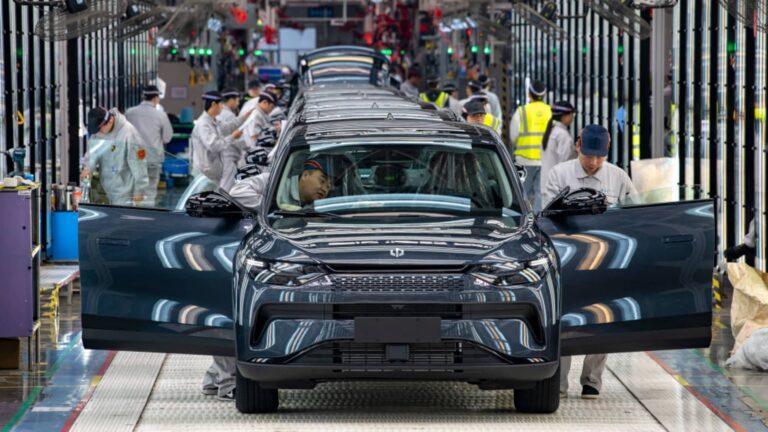Carlos Tavares, CEO of Stellantis, and Jiangming Zhu, Founder and CEO of Leap Motor, shake hands regarding the new partnership between the two companies.
Stellantis
car manufacturer Stellantis expects overseas sales of Chinese-made electric vehicles to expand rapidly through a new joint venture with Leap Motor starting later this year.
The companies announced on Tuesday that sales of Leap Motor vehicles made in China will begin in September through Stellantis’ sales network, which includes dealers in Europe including France, Italy, Germany, the Netherlands, Spain, Portugal, Belgium, Greece and Romania. announced.
These initial markets will be followed by the Middle East and Africa, India and Asia Pacific, and South America in the second half of 2024, the companies said.
Stellantis CEO Carlos Tavares said Tuesday after a press conference in Hangzhou, China, where Leap Motor is based, that expansion plans do not currently include distribution in the United States. He cited new U.S. tariffs on Chinese-made EVs as one reason.
The Biden administration on Tuesday announced tough new tariffs on $18 billion worth of Chinese imports, including quadrupling tariffs on Chinese electric vehicle imports from 25% to 100%.
“Chinese products are very limited in the U.S. market, so it’s not a priority for us,” Tavares said. “There’s a lot going on in Europe, because you can see that Europe is taking a very different approach to this issue…The United States seems to be going for very strong protectionism. For the time being, I see Europe as keeping the market “moderately open.” ”
According to a presentation from Stellantis and Leap Motor, the joint venture’s expansion plans include at least six EVs by 2027. The companies said the vehicles will initially be low-cost vehicles and will complement Stellantis’ current vehicle lineup.
The announcement comes amid heightened geopolitical tensions over Chinese electric vehicles in the United States, Europe and other countries. Many inside and outside the auto industry are concerned that cheaper Chinese-made cars will flood the market and undermine the value of domestic EVs.

“From a Stellantis perspective, our position is to compete. We compete with Chinese car manufacturers and compete as strongly as we can because that is the best way to learn. “It’s part of the best way to stay healthy for the global races we’re currently participating in,” Tavares said.
Tavares said Tuesday that the Chinese automaker, which he has so far called Stellantis’ biggest competitor, is expected to grow rapidly internationally with or without the joint venture’s support.
“Whether I like it or not, with or without me, the Leap motors would have been in Europe anyway…Maybe not as fast, probably not as powerful, but they went to Europe. “I would have done it,” Tavares said. “All I’m doing is trying to be opportunistic with the dynamics created by Chinese automakers.”
The European Union said last year that as of September, Chinese companies accounted for 8% of all-electric vehicle sales in Europe, and that their share could rise to 15% by 2025. The EU believes that Chinese EVs are undercutting local models by about 20% on the European market.
Employees work on the C11 electric SUV assembly line at Chinese EV startup Leap Motor’s factory in Jinhua, Zhejiang Province, China, April 26, 2023.
VCG | Visual China Group | Getty Images
The influx of Chinese EVs has prompted the European Union to begin providing government support to the industry.
“The partnership between Leap Motor and Stellantis demonstrates a high level of efficiency and opens a new chapter in the global integration of China’s intelligent electric vehicle industry,” said Leap Motor Founder, Chairman and CEO. said Jiangming Zhu in a release. “We believe that this collaboration will enable Leap Motor to become a respected, world-class, intelligent electric vehicle company.”
The companies declined to disclose sales forecasts for Leap Motor vehicles sold through the Stellantis sales network, which is expected to grow from 200 locations to up to 500 locations by 2026. Leap Motor has reported that it will deliver 144,155 vehicles in 2023, an increase of approximately 30% from the previous year. Year.
Stellantis owns 51% of the joint venture with Leap Motor announced earlier this year, with an investment in Leap Motor of approximately 21%, including €1.5 billion.
As part of the agreement, Stellantis will have exclusive rights to export, sell and manufacture Leapmotor products outside of Greater China.

